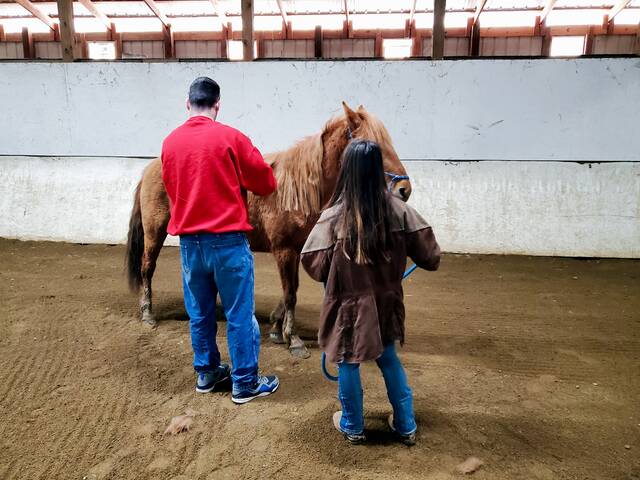
An Army veteran grooms a mustang under the watchful eye of a female Soullstang volunteer. The art of proper grooming and its’ related techniques was one of the first “hands on” skills the veterans learned during the therapy session at the Alfwaress Stables in Amelia, Ohio. Photo courtesy Disabled American Veterans (DAV) Chapter #63 (Clermont County).
Fourteen (14) veterans recently participated in Equine Therapy conducted by the Soulstang Program at the Alfwaress Stables, located in Amelia.
The Therapy Program was jointly initiated by the Cincinnati Department of Veterans Affairs Medical Center (VAMC) Fort Thomas Domiciliary Program and the Disabled American Veterans (DAV) Department of Ohio, who provided the funding for the event.
The Program provided the disabled veterans an excellent one-day opportunity to interact with the mustang horses and comprehend that horses and veterans are similar in a few important ways.
“These mustang horses were originally from the western states and lived on the open prairie and ranges,” explained Tina Caldwell, the Soulstang Program Director. “The horses, just like our military personnel, had to be hypervigilant of their surroundings and potential dangers.”
“Both veterans and horses can utilize the body language and action of others to determine their reaction to certain situations,” continued Caldwell.
“Research, and my experience, has illustrated that a horse can sense a veteran’s suffering and pain; the veteran’s fear; the anxiety of the veteran and is able to react in a positive way with trust and understanding.”
Studies have indicated that equine therapy has been successful in helping veterans show marked improvements in dealing with emotional awareness, impulse control, self-regard, post-traumatic stress and traumatic brain injury.
During the one-day orientation, veterans were instructed with basic equine skills, such as initially approaching the mustangs, maintaining the proper eye contact, methods of correct grooming and touching the mustang to gain trust and assurance of the animal.
“Learning the basic equine fundamentals is necessary before we would even think of having the veterans actually get on the horses,” said Caldwell.
“The primary purpose today was to determine if the veterans were comfortable with working with the mustangs, and if they were to move on to the next step.”
“The VAMC Fort Thomas Domiciliary Program is very interested in this type of equine therapy as a method to develop veterans’ coping skills, a sense of purpose and responsible caring not only for them but for others,” said Cincinnati VAMC Recreational Therapist Taylor Walt. “Every veteran is different and we totally acknowledge that. And we certainly would like to provide them with this unique experience.”
Nancy McFarlane, a recreation therapist at the Portland VAMC in Oregon, said equine therapy seems to be the perfect answer for certain veterans coping with post-traumatic stress, homelessness, and other disorders, both mental and physical.
“When you treat horses well, they will connect with you,” she said. “They trust you. A relationship forms. My veterans tell me they haven’t felt so relaxed in months. They tell me they’re sleeping better at night. They can’t say why, exactly. All they know is that they feel better.”
Navy veteran and Soulstang Program volunteer Gary Jamison noted that the veterans have made great contact with the mustangs. “All of them are participating in the grooming of the horses and just caring for them,” said Volunteer Jamison. “Several veterans, who were initially afraid, at the beginning, had now entered the ring with them and had worked with them in stopping and moving actions.”
Richard Campbell, a Marine Corps veteran and also a Soulstang volunteer, periodically just likes to come to the Alfwaress Stables for the calming effect of grooming mustangs, like Yuma and the others. “Veterans do not need experience working with mustangs to participate. They will not be riding with them, just interacting with them with a Soulstang volunteer.”
“The Soulstang Program was the first type of equine therapy that we looked at and from the reactions of all the veterans that were here, I would say it was a great success,” said Recreational Therapist Walt.
“We will look forward to working with the DAV Department of Ohio in scheduling more of these opportunities for our veterans in the future. It does work and it works for our veterans,” concluded Walt.
An Army veteran grooms a mustang under the watchful eye of a female Soullstang volunteer. The art of proper grooming and its’ related techniques was one of the first “hands on” skills the veterans learned during the therapy session at the Alfwaress Stables in Amelia, Ohio.


